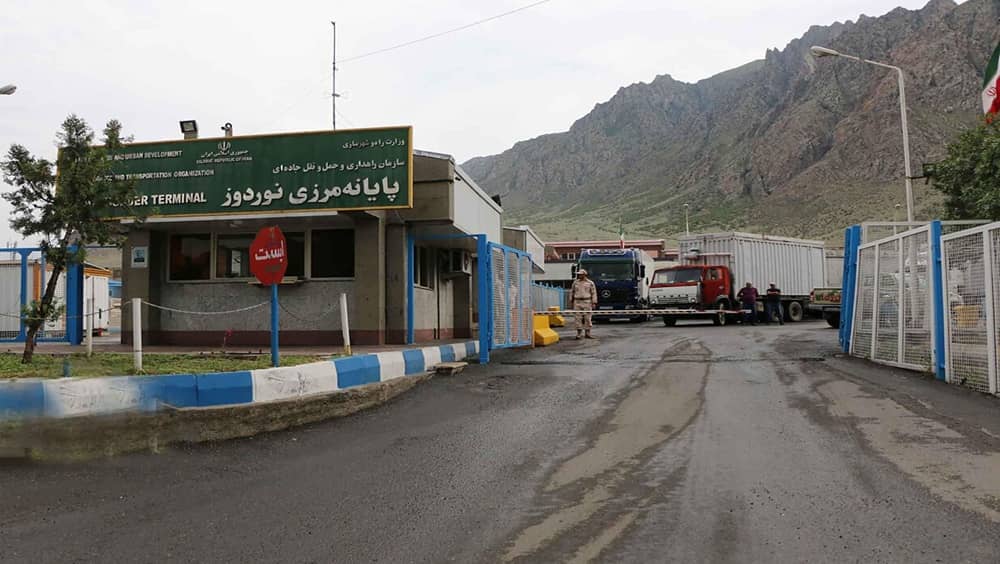Facebook
Twitter
LinkedIn
Pinterest
Reddit
Email
Print
 Nourduz border terminal, Iran’s main crossing with Armenia, August 28, 2021
Nourduz border terminal, Iran’s main crossing with Armenia, August 28, 2021
Two-minute read
The peace agreement signed in Washington on August 8, 2025, between Armenia and Azerbaijan—establishing the so-called Zangezur Corridor—has triggered an unusually sharp and divided response in Tehran. The reactions reveal a regime already weakened by a string of strategic setbacks in recent months, from the erosion of Hezbollah’s deterrence in Lebanon to shrinking influence in Syria and mounting pressure on its militias in Iraq.
The agreement, mediated by the United States but driven by Yerevan and Baku’s own calculations, includes a 99-year lease of a strategic transit route through southern Armenia, connecting Azerbaijan to its Nakhchivan exclave and Turkey. For Iran, the consequences are immediate and severe: the corridor would cut its 44-kilometer border with Armenia, deprive Tehran of a vital transit link to Europe independent of Ankara and Baku, and cement a geopolitical alignment in the South Caucasus that sidelines the clerical dictatorship.
The regime’s Foreign Ministry issued a guarded statement, superficially welcoming peace in principle but warning that any foreign involvement “in the vicinity of shared borders” could undermine regional stability. It stressed that new transport routes must respect “mutual interests, national sovereignty, and territorial integrity” and proceed “without external interference.”
#Iran News: Resignation of Cleric Highlights Regime’s Weakness Amid Tensions with #Azerbaijanhttps://t.co/mT2H1ksXVe
— NCRI-FAC (@iran_policy) January 28, 2025
However, figures close to the regime’s Supreme Leader Ali Khamenei adopted a far more alarmed tone. Ali Akbar Velayati, his senior foreign policy adviser, declared: “Is the South Caucasus an unclaimed region for Trump to rent? This passage will not become a Trump-owned corridor, but a graveyard for his mercenaries.”
The daily Kayhan, directly controlled by Khamenei’s office, warned that the Zangezur route “could become a highway for military and intelligence penetration” if allowed to proceed. In an unusually blunt message to Moscow, it wrote: “Whether with Russia or without it, the Islamic Republic will deliver a decisive, deterrent response… Any complacency or delay in the Caucasus will result in a geopolitical crisis for Russia even more severe than NATO’s presence in Ukraine.”
This is a rare public rebuke of Russia, underscoring Tehran’s unease as Moscow signals acceptance of the deal. Russian Foreign Ministry spokesperson Maria Zakharova has called the draft agreement “positive,” highlighting another gap between Tehran’s expectations and its partners’ priorities.
#Iran News: #Azerbaijan‘s President Calls for Accountability Following Iranian Eulogist’s Insulthttps://t.co/8Bz0otpT5E
— NCRI-FAC (@iran_policy) January 8, 2025
Ali Bagheri Kani, a senior member of Iran’s Strategic Council on Foreign Relations, stated: “The Islamic Republic will not easily let go of the Zangezur issue.”
The regime’s president Masoud Pezeshkian, however, appeared more concerned with managing internal divisions than confronting external threats, telling political rivals: “We must be united so they cannot bring us down. If we are divided, they will spare none of us.”
The divergence between these contradicting approaches reflects a leadership fractured on both policy and priorities. The Zangezur issue has become a proxy for deeper anxieties over the regime’s waning regional leverage.
#Iran News in Brief
The official IRNA news agency quoted an informed source that the regime’s cultural attaché in Baku was expelled from #Azerbaijan and its mission was closed down.https://t.co/rc22s4ytfz pic.twitter.com/XavxRMXrat
— NCRI-FAC (@iran_policy) June 2, 2023
Losing the Armenia border would not only weaken Tehran’s economic connectivity but also erode its strategic depth. With influence already diminished in Syria, Lebanon, and Iraq, Tehran faces the prospect of a new geopolitical reality in which its northern flank is effectively sealed off by U.S.-aligned infrastructure. The corridor would tighten the arc of states cooperating to contain Iran’s reach, further demoralizing its regional networks and emboldening domestic opposition.
As Kayhan warned, “this betrayal must not go unanswered.” Yet Tehran’s conflicting signals—diplomatic restraint from one faction, rhetorical escalation from another—suggest that the regime has no unified plan to reverse its losses. The Zangezur corridor, once operational, may stand as the latest and visible marker of a regime in strategic retreat.